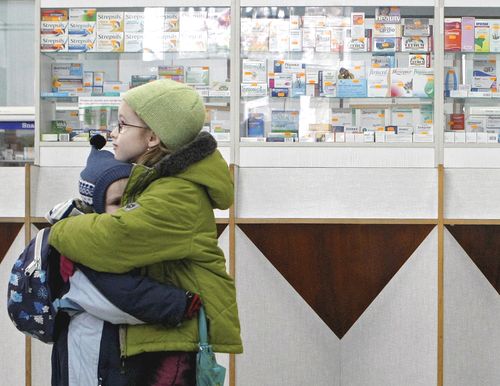“It seems like their purpose is to kill us”
Participants of Queue for Life nationwide flash mob speak about new import licensing regime for medicines
NGOs staged a flash mob called Queue for Life in Kyiv, Donetsk, Luhansk, Simferopol, Lviv, Kharkiv and other cities on February 12. Concerned citizens, activists, patients and doctors queued at pharmacies. “We staged it to reach the president personally so that he would intervene in the grave situation that may emerge from March 1. We all understand that a lot of imported medicines may disappear altogether from pharmacies, while others will grow more expensive,” the event’s participant, social activist, and a trustee of the National Children’s Hospital Okhmatdyt Hanna Hopko told The Day. “Pharmaceutical companies that operate in Ukraine need to go through numerous complex bureaucratic procedures to have their products registered. Now, another such procedure looks set to be forced on them which has nothing to do with the quality control but is aimed squarely at the monopolization of the pharmaceutical market so that some officials will receive larger bribes.” The activist stressed that “at first, the government had not even had a body authorized to issue these additional licenses” nor had it developed transparent licensing mechanisms, and only through citizen participation the situation was beginning to improve.
Meanwhile, the Ministry of Health (MoH) insists that such medicine licensing regime is a generally accepted international standard that ensures every batch of the product’s compliance with the requirements, and it will in no way affect the range of medicinal products offered at pharmacies. The MoH’s State Administration of Ukraine for Medicinal Products’ spokesperson Olena Litsoieva told the media that new licenses would be issued to importers under a simplified procedure from March 1.
However, representatives of foreign pharmaceutical companies believe a simplified procedure to be unfeasible, mostly because time is running out while the government still has not provided any information to the producers. “There is very little time left to obtain licenses and to draft and adopt a simplified licensing procedure,” an assistant with the European Business Association’s health care committee Inna Hryshchenko remarked in her comment for The Day. The expert emphasized the particularly pressing need to clarify whether licenses might be issued under a simplified procedure to foreign companies operating in Ukraine through representative offices only, without creating legal entities, as most of them, in fact, do.
The experts do not dare to predict how many medicines will remain on the shelves of pharmacies on March 1. “Of course, pharmacists do have some stocks, but nobody knows enough to give a meaningful estimate of these stocks’ range and size,” Hryshchenko said.
However, the seriously sick Ukrainians will be the most affected by this situation. “There is the special class of medicines, including ones used in the treatment of cancer, which are imported into Ukraine only to the extent awarded through a tender process. Therefore, there can be no stocks of these medicines. They will run out completely as soon as March 1. The seriously sick patients are the most endangered now,” Hryshchenko concluded
The Donetsk flash mob participant Svitlana, living with HIV for 15 years, said: “I am afraid that foreign medicines will not pass the licensing, and they are irreplaceable.” Andrii, suffering from hepatitis C, agreed: “We need lifelong treatment. Any interruption is life-threatening. It seems like their purpose is to kill us,” he remarked in an interview with The Day’s own correspondent in Donetsk Kateryna Yakovlenko.
According to Hopko, the public urges the government to repeal the law, then come together with the NGOs which work directly with sick people and promote patients’ rights, and jointly discuss the current issues with the seriously sick patients’ access to quality medicines and their timely provision by the state. “They did not invite us to participate in drafting this law, and it passed the parliament without debate. This is not the way to do things,” Hopko said.






